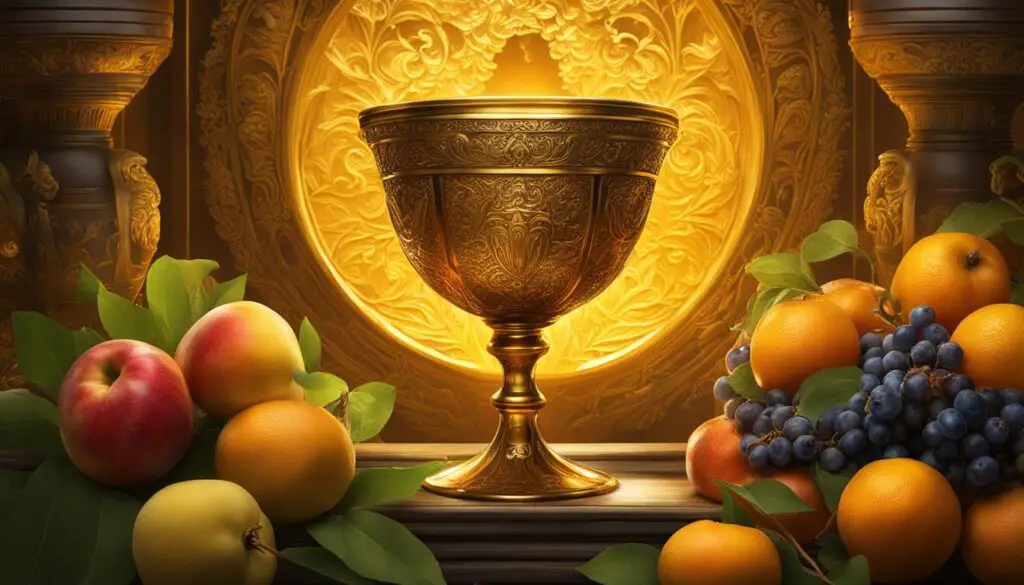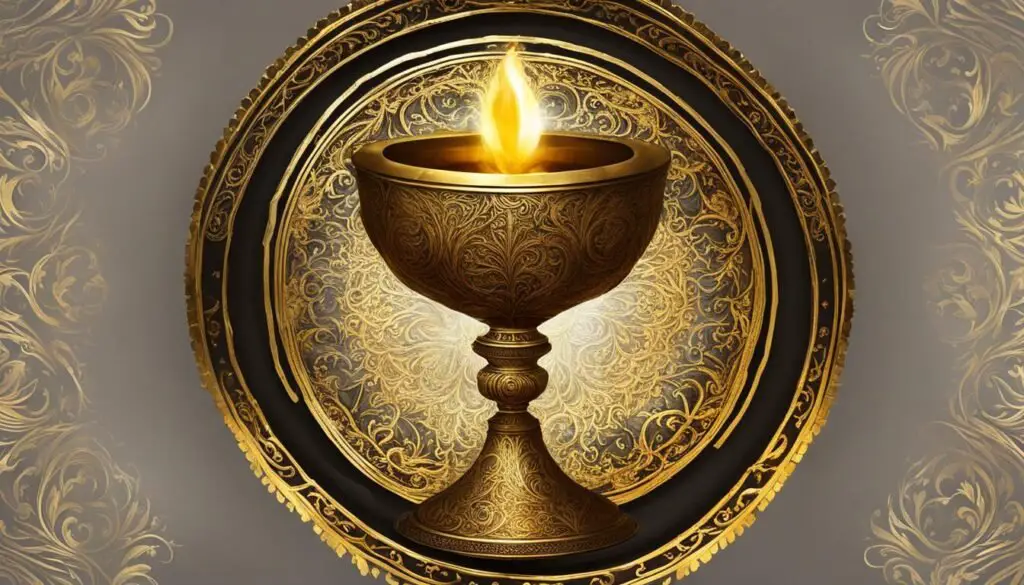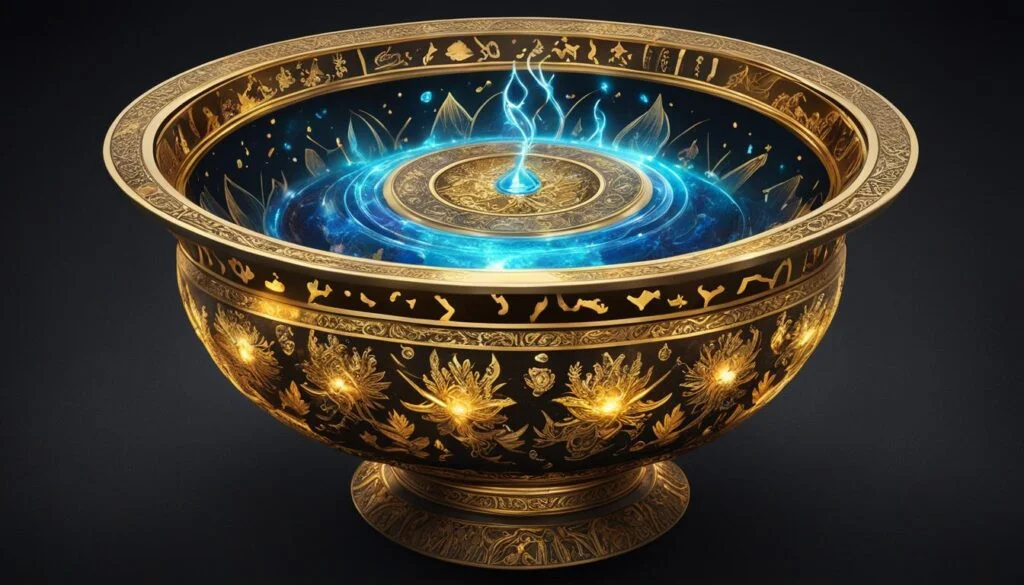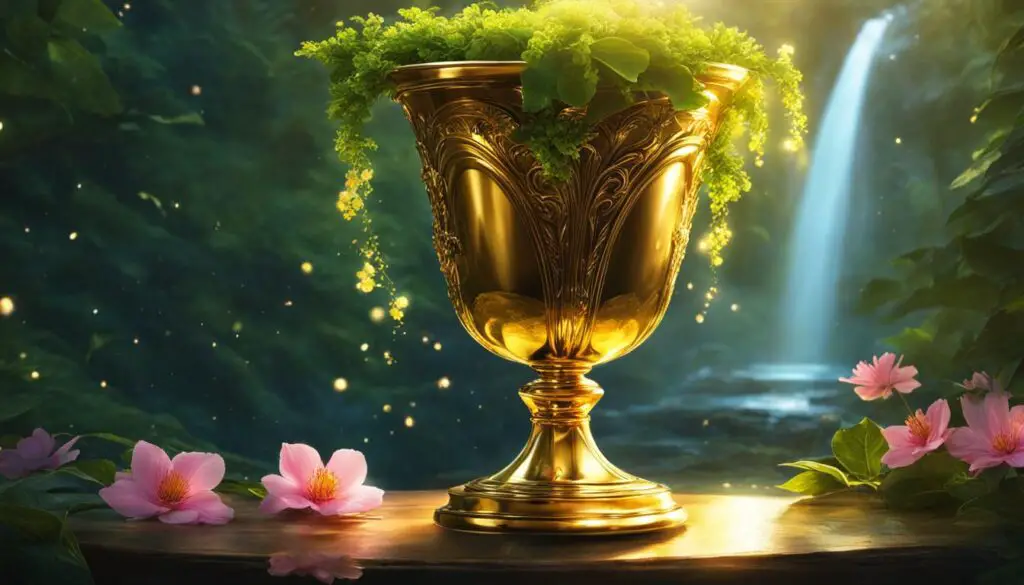In Greek mythology, ambrosia holds a special place as the divine food of the gods. This mysterious substance symbolizes immortality and power in the realm of the Olympian gods. Often mentioned alongside nectar, which is the drink of the gods, ambrosia is believed to grant eternal life to those who partake of it.
While the exact nature of ambrosia is the subject of speculation, there are popular theories about its composition. One possibility is that ambrosia and nectar are actually honey and wine, two essential ingredients that play a significant role in ancient Greek culture. Honey can be eaten and used to make mead, a favorite drink in ancient Greece, while wine has long been associated with celebration and divine influences.
Ambrosia and nectar were revered as the food and drink of the Olympian gods, and their consumption was thought to bestow immortality, power, and strength upon the gods. These divine substances were served to the gods by Hebe and later by Ganymede, emphasizing their importance in maintaining the gods’ immortal status on Mount Olympus.
Key Takeaways:
- Ambrosia is the divine food of the gods in Greek mythology, often mentioned alongside nectar.
- The true nature of ambrosia is uncertain, with honey and wine being popular theories.
- Ambrosia and nectar were believed to grant immortality and played a vital role in maintaining the gods’ powers.
- Honey and wine, two key ingredients in ancient Greek culture, are potential candidates for the composition of ambrosia.
- The consumption of ambrosia and nectar symbolized divine sustenance and power in Greek mythology.
The Food and Drink of the Olympian Gods
Ambrosia and nectar were the revered sustenance of the mighty Olympian gods in Greek mythology. According to ancient beliefs, the regular consumption of ambrosia and nectar endowed the gods with immortality, immense power, and unwavering strength. Without these divine substances, their life force would wane. Hebe, the cupbearer of the gods, and later Ganymede, served ambrosia and nectar to the divine assembly atop Mount Olympus.
Legend has it that the consumption of ambrosia and nectar bestowed upon the gods the ethereal ichor, a celestial life force. While the exact nature of these heavenly delicacies remains uncertain, their significance in the realm of Greek mythology is undeniable.
The Mythology and Symbolism of Ambrosia

Ambrosia holds a significant place in Greek mythology and religion. It is often associated with stories of immortality, divinity, and the gods. In various myths and legends, ambrosia is used as a symbol of divine sustenance and power.
Ambrosia is mentioned in the context of important events, such as the birth of Zeus and the actions of Achilles. Its consumption is believed to grant eternal life and preserve the body from decomposition. The symbolism of ambrosia reflects the high regard the ancient Greeks had for the gods and their attributes.
Ambrosia appears in numerous myths and legends, weaving its way into the tapestry of Greek religion. The tales often portray ambrosia as an essential element in the lives of mythical beings, such as nymphs and demi-gods. Its divine nature highlights its significance as a source of strength and immortality.
Ambrosia in Other Mythologies and Religions

The concept of a special food or drink that grants immortality or longevity is not exclusive to Greek mythology. Similar ideas can be found in other mythologies and religions.
In Zoroastrian and Vedic mythologies, there are references to a drink called Soma and Haoma, which was believed to provide immortality.
In Egyptian mythology, Thoth and Hermes Trismegistus were said to consume ‘white drops’ or ‘liquid gold’ that granted them immortality.
The Sumerian goddess Ninhursag was associated with a milk that could make gods and kings immortal.
Hindu mythology mentions a milk called Amrita, which was consumed by the gods for immortality.
Chinese mythology speaks of the Peaches of Immortality, which ensured everlasting existence for the gods.
These various mythological references suggest a widespread belief in the power of a special food or drink to bestow immortality or longevity.
The Search for the Elixir of Life

The quest for immortality has fascinated humanity throughout history. Alongside mythical stories of divine ambrosia and nectar in Greek mythology, alchemists in the medieval times also embarked on a search for the elusive elixir of life. This legendary substance, often associated with the philosopher’s stone, was believed to possess the power to grant eternal life and even transmute base metals into gold.
The pursuit of the elixir of life was not merely confined to myths and legends but also captured the attention of historical figures. One such individual is Cagliostro, an enigmatic figure who claimed to have discovered the secret to immortality. Another notable figure is Count Saint Germain, an immortal alchemist who supposedly possessed the elixir.
The concept of the elixir of life may be viewed as mythical; still, it represents humanity’s deep-seated yearning to unravel the mysteries of eternal youth and immortality. Despite the elusiveness of such a substance, the desire to extend life beyond its natural boundaries continues to captivate the human imagination.
Conclusion
Ambrosia, the divine sustenance of the gods in Greek mythology, occupies a significant place within ancient tales and legends. While its exact nature remains open to interpretation, honey and wine are popular candidates as potential ingredients. Believed to bestow immortality, ambrosia and its counterpart, nectar, played a vital role in the stories surrounding the Olympian gods. However, such notions of a special food or drink offering eternal life are not exclusive to Greek mythology; similar concepts can also be found in other mythologies and religions.
The enduring fascination with immortality is evident in both mythology and history. From the quest for the philosopher’s stone in alchemy to legendary figures like Cagliostro and Saint Germain, humans have always been captivated by the idea of finding an elixir of life. Ambrosia, as a symbol of power, immortality, and divinity, continues to resonate across different cultures and time periods, highlighting humanity’s timeless desire to unravel the mysteries of eternal life.
In Greek mythology, ambrosia represents not only a source of sustenance but also an embodiment of the divine. This mystical food of the gods demonstrates the interconnectedness between power, immortality, and the divine realm. Its significance extends beyond the boundaries of Greek mythology, making it a testament to the enduring allure of ancient tales and their impact on human consciousness throughout history.
FAQ
What is ambrosia in Greek mythology?
Ambrosia is the divine food of the gods in Greek mythology. It symbolizes immortality and power and is often mentioned alongside nectar, which is the drink of the gods.
What does ambrosia mean in Greek mythology?
In Greek mythology, ambrosia is the food of the gods that grants them immortality, power, and strength.
What is the relationship between ambrosia and nectar in Greek mythology?
Ambrosia and nectar are thought to be one and the same, with ambrosia being the food and nectar being the drink. They are often served together to the gods.
What are the theories about the true nature of ambrosia and nectar?
Honey and wine are popular candidates for the true nature of ambrosia and nectar, as they can be eaten and consumed as a drink, respectively.
How did ambrosia and nectar grant immortality to the gods?
It was believed that by regularly consuming ambrosia and nectar, the gods maintained their immortality, power, and strength. The consumption of these divine substances turned their blood into ichor, a heavenly life force.
What role did ambrosia and nectar play in Greek mythology?
Ambrosia and nectar were served to the gods on Mount Olympus and were used as restoratives and anointing fluids in various myths and legends. Their consumption played a significant role in the mythology of the Greek gods.
What is the significance of ambrosia in Greek mythology and religion?
Ambrosia is associated with stories of immortality, divinity, and the gods. It is used as a symbol of divine sustenance and power and is mentioned in connection with important events and mythical beings. Its consumption is believed to grant eternal life and preserve the body from decomposition.
Are there similar concepts of a special food or drink granting immortality in other mythologies and religions?
Yes, similar ideas can be found in Zoroastrian and Vedic mythologies, Egyptian mythology, Sumerian mythology, Hindu mythology, and Chinese mythology.
What is the quest for the elixir of life?
The quest for the elixir of life is the pursuit of finding a substance or drink that grants immortality or eternal youth. It has captivated the human imagination throughout history and can be found in mythology and history.
What is the connection between Greek mythology and the search for the elixir of life?
The search for the elixir of life reflects the timeless human fascination with immortality and the desire to unlock the secrets of eternal life. Ambrosia, as a symbol of power, immortality, and the divine, remains significant in Greek mythology.




